Let me tell you a story. The other day I was poking through the shops in Downtown Disney and came across the shirt below.
“Wow! That is cool!” I thought to myself. “But should I be upset by it? Would buying it make me a hypocrite?” As you may recall, I wrote an article recently titled Of Bouncy Bits and Cleavage Windows that discusses many of the issues facing the physical appearances of women in comics. Because of this, I pondered and debated about if the shirt was problematic for probably longer than I should have. Then I realized, it wasn’t about the fact they were wearing heels. It was that despite the fact that they were wearing heels, they could still kick your ass. Their costumes didn’t make them any less heroic. Needless to say, I bought the shirt.
While I certainly wouldn’t mind seeing female characters in more practical costumes, I sometimes think we’re missing the bigger picture that extends beyond a simple debate about costuming. The real heart of the matter is the substance of their personalities. What they believe, what they fight for, what they want. It is how they are portrayed and how they are treated by their male counterparts. Are they constantly being saved by men? Is their only true purpose to be eye candy or become freezer bait? Or is it that they can fight as well as the men? That they are characters that can rely on themselves instead of constantly becoming the damsel in distress?
Women in comics are getting more dynamic and varied in their personalities. They aren’t all just the girlfriends of heroes, and a lot of them are the heroes themselves. To my mind, this is where more and more comics are getting it right. Though, as with most things, there is a “however.”
[Please skip this part if you don’t want spoilers from The Astounding Wolf-Man, Werewolf By Night, or The Walking Dead.]
Here’s the “however.” While many female characters seem to be branching out and growing in their self-reliance and are being used less as plot devices, many aren’t. In all three of the recent comics I listed above, the wife (and in two cases, child) of the main male character is killed. This happens in movies at least as much as it does in comics. Killing women as plot devices or as a way to develop a male character in the story is still alive and well.
Let’s focus on The Walking Dead for a moment. While the male to female death ratio is fairly even, there is an awful lot of violence directed at women specifically. I’m only through volume nine, but so far there’s been a serial killer that targets women in the group. He manages to kill a few and permanently scar another. Then another female character is beaten and raped repeatedly by her captors. Yet of the two men with her, one suffers the loss of a hand and the other extreme mental scarring. Not great options, but they seem pale to me in comparison to repeated and violent rape which is inclusive of both the physical and mental torment the men were subjected to.
The Walking Dead does an amazing job of portraying a wide array of female characters by way of personality and appearance. Though, whatever the reasons, and however you justify it, there is still a lot of targeted death and violence surrounding them.
[Those of you trying to avoid spoilers can open your eyes now.]
The Reader’s Digest version of what was in the spoiler section is that there are still a lot of female characters that are targets of murder and rape. Now this is where I really want to see more balance in comics. I’m not saying that we should start a new line of sodomy comics or start killing off husbands. I’m saying I’d like to see the women get taken a little less advantage of. Rape is real. Murder is real. Comics are not. They don’t always have to follow the rules of our world.
Let’s look at another example from the Infinite Crisis. There was a character named Sue Dibny who was the wife of the Elongated Man, and in many ways she was his partner and his equal. During Infinite Crisis, her back story was retconned to include rape and she was murdered, and burned, all while with child. Her murder was used as a plot device to lead to the discovery of a string of murders. Here was a strong, likable female character that had her history revised to add in rape before killing her off in an extremely grisly manner. Let’s also add in the fact that the murderer ended up killing Sue to try and win back her husband. One woman killed another woman over a man.
It is very hard for me to be a woman reading comics sometimes. I get tired of seeing wives getting picked off and women being raped. This is where the balance is most important to me. It’s not the costumes, it’s not the breast size. Those both irritate me on some level, but not nearly as much as this. Histories can be rewritten, canon of the characters retracted, but it doesn’t erase the ink from the paper, it doesn’t mean it was never written and drawn.
Some women fight in heels. Some also die in them.
For previous columns written by Mac, click here!
Mac Beauvais
mac@comicattack.net
@Macabri

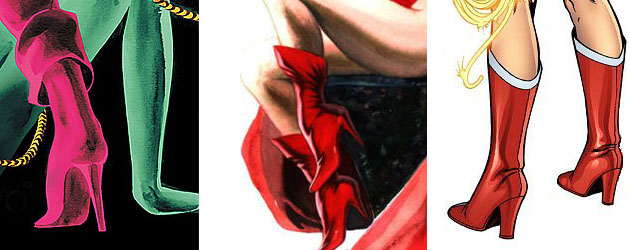
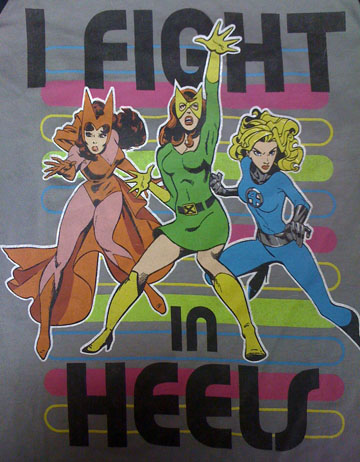
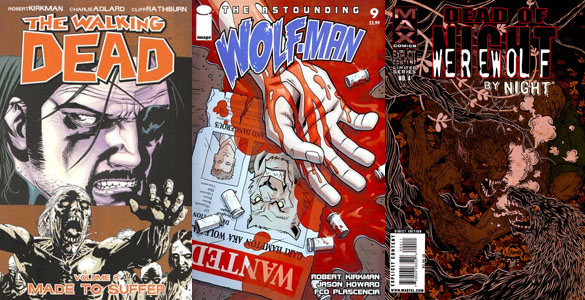
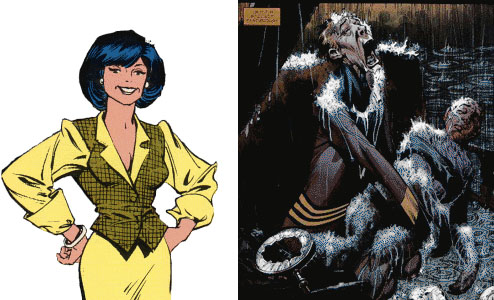
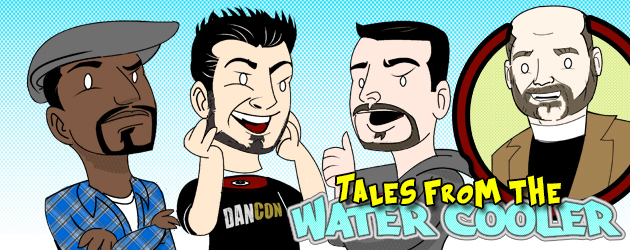
Wow, this is a great follow-up to your last article on the subject; great job! Also, that’s the cleverest title I’ve seen on anything in a long time, haha.
‘The real heart of the matter is the substance of their personalities. What they believe, what they fight for, what they want.’ <- I think that really goes to the heart of the problem with women in refrigerators. When a character stops being that character and becomes Female Victim A, it's not just doing a disservice to women in general, it's plain sloppy writing from an author unwilling to put themselves into that role and deliver the situation from a place of humanity. I don't think these writers are intending to put on some misogyny clinic, they just don't really see the line between a character and a de-humanised plot point all the time, especially in the realm of horror and superheroes that really put plot up on a ridiculously high pedestal.
I think we also need to start remembering what we want out of our fantasies better. Rape happens, murder happens, but why should that justify these occurrences in a fantastical story context? I'm no Ditko-style white hat proponent and I like my grit and deconstruction, but I get sick of hearing people say, 'It's just a book/game, what are you getting so worked up about,' out of one side of their face and, 'The books need to be realistic, so women need to be weak/raped/murdered/bad drivers,' out the other. What fantasy is this 'realism' supposed to be fulfilling? If we want to explore real, then we need to send fantasy on vacation. Having it both ways just leaves us grasping to justify some nonsense that was never intended in the first place.
Pingback: Tweets that mention I Fight in Heels: Balancing Women in Comics -- Topsy.com
I’m glad you liked the article Jade. I really like your comment about the difference between fantasy and reality. It seems that people want it both ways, and it doesn’t always work like that. I also hate the often repeated comment that you shouldn’t get so worked up about it. I find it’s often said by people who don’t have an opinion or they just want to make you shut up.
I also think that by ignoring the concerns above, that comic book companies are cutting out a large chunk of their potential audience. It’s not just a boys club anymore, and they need to be mindful of that.
Great article! I think that retcon of Elongated Man’s wife is ridiculous and just foolish. I think if there were more women writers, the medium would change drastically and mirror most of your thoughts on the subject.
I brought this up in my manga females write up…..
Caska is an amazing character in the Berserk anime. She leads her own battalion of soldiers in Griffith’s army, and she is his right hand (wo)man. However, she is also one of the only characters I’ve seen whose menstrual cycle is used as an actual weakness within the story. They’re in the middle of a battle, and she can’t fight off this huge guy attacking her because she’s too busy nearly fainting from cramps and exhaustion. It’s also pointed out that although she is incredibly strong, she will never be as strong as any man. This is in a series where the main character is a HUGE guy with superhuman strength and agility. Why can’t the girls be fantastical, too? And, of course, the worst weapon used against her (multiple times, in particular once as a child, and again by the man she admired) is rape. Now, Berserk is very dark and gritty, so it’s not like this is out of place. (And sexual molestation is used against one of the main males as well.) Still, it’s driven home that, although she’s a very strong and capable woman, she’s still just a woman.
Another good article, Mac.
Ah, I don’t think more female readers or creators solves the problem per se.
I’m personally optimistic enough to think that humans can understand each other better just by being open to those experiences and willing to listen and learn. I don’t see any reason we need to wait around for the demographics to change when a little empathy is simple and available to everyone.
Also, on the cynical end, I’m a big manga addict and despite being the most egalitarian media industry across the charts for decades I’ve really had to grit my teeth through a few recent books written by women specifically for women or girls.
@Jade- The demographics changing is a far faster means to getting people to see what you’re talking about though, and in turn would get the word out on a huge level compared to the current level (comments, threads). If there were more women writers, I believe more male writers would become in tune with what you’re trying to say because they would be reading it everyday.
While I agree that having more women writing in comics would help, there needs to be more of a shift in the mindset of male writers, too. It shouldn’t be an us and them, male versus female, it should be a collective effort to move forward and widen the appeal of comics to readers of both genders.
Plus, from a purely business sense, having a wider demo purchasing your products means a better revenue stream.
@Mac- Having women writing more means men reading more stuff written by women. That’s the point I’m trying to make. If it was in someones face on a daily basis, they (men) would be more likely to change their perspective. 😀
@Billy – It would be great to see more women writing superhero books, but in order for that to happen, there needs to be a large enough female fanbase to produce an exceptional individual that wants to write superhero books and is a capable enough writer to be able to get the job. Otherwise, maybe they could get a female mangaka to write a superhero book, but then the language barrier would require an even more exceptional individual. Beyond that, if you, say, get C.J. Cherryh, if she’s even interested, to write a superhero book for the purpose of drawing more female readers to an already male-dominated fan-base, I think that’s coming dangerously close to the borderline of reverse sexism.
I assume that the doors are most definitely open to female writers already, but until there are enough to really make an impact, a skilled male writer should be capable of writing female characters better. Like Mac said, they just need to be more mindful of who is reading the comics and I’d like to add that there are plenty of male readers who have no tolerance for sexism either.
Pingback: The Walking Dead Volumes 1-12 - Strange Like That
Pingback: Keeping Busy - Strange Like That
I’ll also add that the “dead mother” is (or at least was) a common trope in Japanese manga. Ranma 1/2, one of the most popular anime series in Japan, is an example. The manga, though, is written by a woman.
Going back to Bouncy Bits, I think the sexualization of women in comics is a part of the sexualization of women in society, which is quite complicated (which would explain your feelings of the t-shirt). When does a woman’s femininity stop and her objectification start? You yourself have a “glam” shot which I find quite… hubba hubba (; Love the werewolf pics as well.